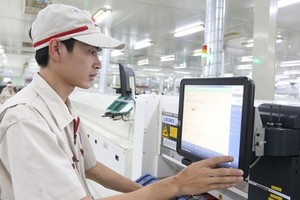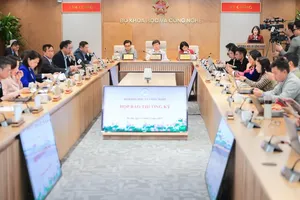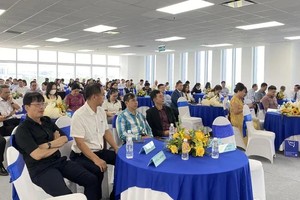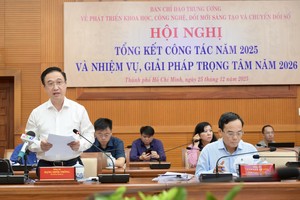)
The Ho Chi Minh City Party Committee has officially issued an action plan to carry out the Politburo’s Resolution No. 57-NQ/TW on advancing science, technology, innovation, and national digital transformation (Resolution 57).
The Ho Chi Minh City Party Committee has requested all relevant agencies and departments to strictly adhere to the principles, objectives, tasks, and solutions set out in Resolution 57, calling for a focused and practical, not superficial or fragmented, approach.
The directive underscores the importance of institutions, mechanisms, and policies as guiding forces while identifying digital transformation as a key driver that must be closely linked to and promote the development of science and technology, as well as innovation. The city will pilot the project in which initiatives are tested and evaluated before being scaled up, ensuring effectiveness and minimizing risk.
The Ho Chi Minh City Party Committee has called for a comprehensive review to identify and promote the city's potential and advantages across all sectors while also pinpointing limitations, systemic obstacles, and impediments that must be addressed in a timely and thorough manner.
Priority will be given to sectors such as science and technology, innovation, and digital transformation that can generate breakthrough results and broad effects.
The Ho Chi Minh City Party Committee has also required that all tasks and solutions must be clearly defined and realistically aligned with the city’s conditions. The goal is to foster the growth of science and technology, innovation, and digital transformation that are capable of competing on a regional and global scale, particularly within Southeast Asia.
Targets and tasks must be associated with specific timelines, with clear designation of lead agencies and coordinating units. Resource allocation must be tailored to the requirements of each task, avoiding fragmented investment and unnecessary waste.
One of the key requirements of the action plan is the resolute, synchronized, and unified implementation of Resolution 57. All proposed solutions, programs, and projects must be carefully evaluated for feasibility and socio-economic effectiveness. The city will prioritize the allocation of resources to major sectors capable of generating widespread impact and high added value while avoiding fragmented, superficial, or trend-driven efforts.
Among the key tasks outlined by the Ho Chi Minh City Party Committee is the completion of institutions and the development of breakthrough policies to ensure adequate resource allocation.
The city will proactively review and propose amendments or additions to legal documents within its jurisdiction or submit proposals to higher authorities. The goal is to establish preferential policies in scientific research and innovation.
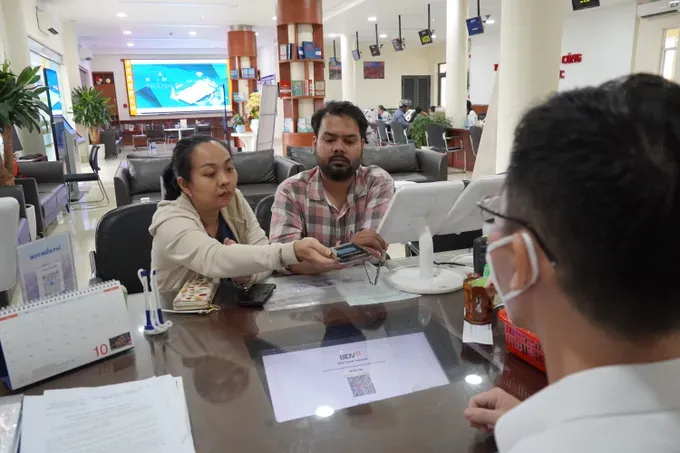
The Ho Chi Minh City Party Committee has underscored the importance of developing detailed plans and strategies for the city’s science and technology, innovation, and digital transformation for the 2025–2045 period, aligned with the city’s overall development master plan with a vision to 2045. The directive calls for the engagement of the political system to ensure the successful implementation of these strategies and plans.
In addition, the city has also called for the development of breakthroughs, preferential mechanisms, and policies to accelerate investments in the innovation centers, startup incubators, laboratories, and digital infrastructure, as well as attract high-quality human resources and create favorable conditions for international experts to participate in major research and development projects.
One of the key solutions is the creation of mechanisms and conditions to facilitate technology transfer, including a trial of new technologies and new business models (sandbox) with risk controls in place and mechanisms to support businesses, startups, innovation, and the development of digital technology companies.
A pilot mechanism project will be built to allow businesses to test new technologies and support users associated with new technology, new materials research results, and new business models under government oversight.
The action plan also includes liability exemptions for businesses, organizations, and individuals in cases where economic losses occur during the trial due to objective, unforeseen factors. This measure is intended to create a transparent and competitive environment with minimal barriers to innovation.
Ho Chi Minh City has approved a pilot initiative to establish venture capital funds with the use of the State budget. Under the scheme, dedicated venture capital funds and corresponding policies will be created to support innovative startups, technology incubators, and digital transformation. These funds will be allowed to invest in high-tech enterprises, science and technology companies, and innovative startups operating in strategic scientific and technological sectors. The initiative aims to drive innovation and accelerate the commercialization of scientific and technological products.














